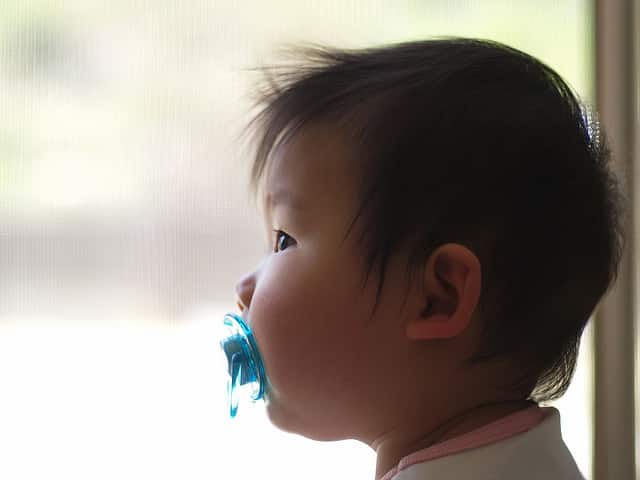
Unless they are parents, most people do not think deeply about the pacifier (binky, fussplug, dummy, fooler, cork, meemer, mute button, soothie). Over the years, many rumors have circulated. According to recent science, it is true that pacifier use can increase ear infection risk, but false that pacifier use causes the teeth to grow in crooked. This one is counterintuitive — pacifier use actually reduces the chance of Sudden Infant Death Syndrome.
What we are interested in here is obesity, and anything that appears linked to both obesity and pacifier use. It is now widely accepted that breastfeeding is beneficial for several reasons, physical and emotional, and one of them is that breastfed babies tend to be less obese. However… What if something threatened to interfere with that happy condition? Like, for instance, pacifier use?
The World Health Organization used to recommend withholding pacifiers to avoid “nipple confusion.” Everybody thought that giving a baby a pacifier would satisfy much of the instinctual urge to suckle, and render the baby less willing to put in the hard work of obtaining breastmilk, which is better than formula. (See Dr. Pretlow on formula, at Fooducate.) The received wisdom was that, once acclimated to the artificial teat, the baby would of course prefer formula from a bottle, and shun the mother’s natural offering.
A few years ago, a study determined that this is not true. As it turns out, babies who are denied pacifiers are apt to consume even more formula. The bottom line is:
Results showed that the rate of exclusive breastfeeding on the mother-baby unit decreased significantly after pacifiers were restricted — from 79 percent of infants in July to November 2010 to 68 percent in January to August 2011. In addition, the proportion of breastfed infants receiving supplemental formula increased from 18 percent before the policy was changed to 28 percent afterward.
In another publication, but in regard to the same Oregon Health & Science University study, writer Nicole Caccavo Kear quoted lactation consultant Freda Rosenfeld:
Some babies can’t meet their sucking needs by feeding alone, so there’s nothing necessarily wrong with a newborn using a pacifier, if she is gaining weight well and has recently been fed. Just take care to not offer a paci to your baby instead of your breast when she might be hungry.
Meanwhile, a serious threat emerged, in the form of revelations about di-ethylhexyl phthalate (DEHP), a chemical that is in plastic. Plastic is in pacifiers, or at least, used to be.
Hopefully, something has been done about it, because kids with higher DEHP levels also have higher BMIs, and that means obesity. Barbara Bronson Gray says:
The chemical […] is suspected of being able to alter biological functions involved in fat metabolism. In the study, children with the highest DEHP levels had nearly five times the chance of being obese compared with those who had the lowest DEHP levels… The increased risk of obesity with elevated DEHP levels was not related to the amount of physical activity they got or their daily calorie intake.
Your responses and feedback are welcome!
Source: “5 Binky Basics: What You Need to Know About Pacifiers,” Parents.com, undated
Source: “Pulling plug on pacifiers: New data do not support recommendation to restrict soothers in breastfeeding infants,” ScienceDaily.com, 04/30/12
Source: “Plastics Chemical Linked to Obesity in Kids,” HealthDay.com, 06/23/12
Photo credit: mliu92 via Flickr

 FAQs and Media Requests:
FAQs and Media Requests: 











